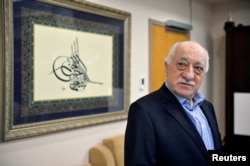Turkey’s pro-government media, usually critical of the United States, welcomed the inauguration of U.S. President Donald Trump.
Turkish presidential spokesman Ibrahim Kalin spoke warmly of the new American president, saying the Trump administration "has a perspective that will guard Turkey’s sensitive position in the region."
“I hear from U.S. sources, Trump is going to be more amenable toward the Erdogan government than many people assume. I think this is what Ankara is relying on,” said Semih Idiz, a Turkish political columnist for the Al-Monitor website. Idiz suggests that while bilateral ties were severely strained under the Barack Obama presidency, there is hope Trump can put relations back on track.
“They have common enemies, I think they will try and concentrate on that. So yes, the government is expecting more from the Trump administration than it got from the Obama administration."
Prime Minister Binali Yildirim last week spelled out what the Trump administration needs to do to reset relations. On the list was speeding up the extradition of U.S.-based Turkish cleric Fethullah Gulen, who Turkey's government accuses of being behind a failed coup last July.
Yildirim also has demanded Washington end its military support for the Syrian Kurdish PYD group and its militia, the YPG, which is fighting to capture Raqqa, the Islamic State group’s self-declared capital. Ankara accuses the PYD of links with Kurdish insurgents in Turkey.
But many experts are advising caution. "The extradition of Gulen is a judicial matter on which Trump has very little control,” said Atilla Yesilada, a consultant with GlobalSource Partners, adding: “The PYD is doing a good job marching on Raqqa. I do not see Trump immediately interfering with this relationship.”
According to Yesilada, last week’s U.S. Senate confirmation hearing for Secretary of State nominee Rex Tillerson is instructive. “Rex Tillerson, the new secretary of state, he also defended the Kurds as valiant allies and he said the United States will be fighting the Muslim Brotherhood, which is an ally of Erdogan,” said Yesilada.
Idiz called for a lowering of expectations, but said there is still reason to be cautiously optimistic about bilateral relations:
"Obama was seen as a panacea to everything and it did not work out. This is an endemic situation, and so you are going to be disappointed no matter what. But I think you will see a change of tone under the Trump administration in relations between Turkey and the United States. So that it is what a lot of people are looking for, rather than any panacea or magic wand that will fix everything overnight."
Analysts warn relations could be strained further over the Trump administration's deliberations to move the U.S. Israeli embassy from Tel Aviv to Jerusalem.
Trump’s strong backing of Israel’s settlement building program on the West Bank and in Jerusalem is also likely to cause Ankara concern. A Turkish Foreign Ministry statement slammed Israel's approval for new Jerusalem settlements, describing it “as another indication of disregard for international law, Israel’s latest."
“We keep hearing words [from Trump] about the Middle East that are actually disturbing,” said Turkish President Recep Tayyip Erdogan on Sunday before leaving on a visit to three African countries.
“I think Turkey has built up this picture of Trump as anti-Obama and therefore pro-Turkish, which is foolish and it's not going to happen,” said consultant Yesilada.
Concern is growing over how Erdogan will react if expectations of a reset with Washington are dashed. “I think they [Turkey] will side closer to Russia,” predicted Yesilada. Bilateral relations with Moscow have recently been improving, as relations plummeted with Washington.
The Turkish airbase at Incirlik, which is used by U.S. forces, will likely again be on the agenda. "Their [U.S.] presence [in Incirlik] is being questioned by our people and nation, and this issue is on the agenda of the government,” said Deputy Prime Minister Veysi Kaynak earlier this month.
However, a question increasingly being asked is how a Trump administration would react to any hardball tactics by Ankara,. A senior European diplomat, speaking anonymously, warned of unpredictable consequences given the volatile nature of the two countries' leaders.





